TEDxChennai is one of those independently organised TED events that happen around the world. This is the event’s fifth year in running in Chennai – my first, attending a TED event and I liked it. Many of the speakers were great and the work they have done was outstanding. Listening to similar themes, by evening I felt TED(x) was all about poor kids and empowerment of the underprivileged, but it was still motivating and uplifting. The venue at Sir Mutha Venkatasubba Rao Concert Hall was great, the organizers need to improve their act in few areas – ease of onsite check-in (for many including myself, the badges were given only during Lunchtime and they showed empty in the area of our interest), Time Management (started late by 20 minutes and lunch was at 3 PM) and on the refreshments (considering it was a paid event, not having Coffee/Tea available was unforgivable for me, the Coffee Day outlet at the venue was super overcrowded).
1.The day started with a performance by Karthik Iyer‘s fusion music band – IndoSoul (YouTube).
2.Aditi Prasad, CIO of Robotix Learning Solutions spoke about how she and her sister started a program – “Indian Girls Code“, a free hands-on coding and robotics education for underprivileged girls. She shared her experience on their initiative at Anna Ashram in Trichy.
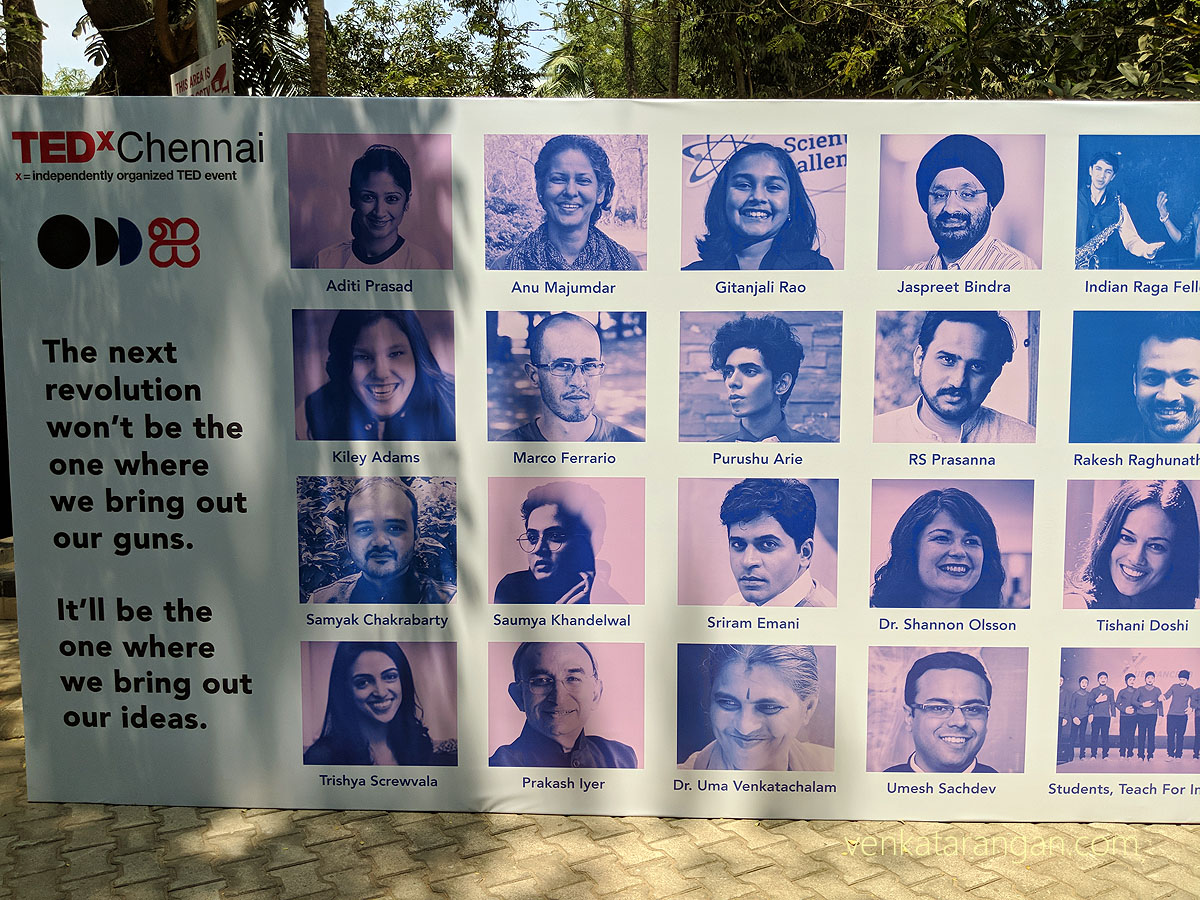
Speakers of TEDxChennai 2018
3.Samyak Chakrabarty leading X Billion Labs, spoke about his blueprint for aligning different stakeholders such as governments, businesses and people. I liked his approach of partnering with Governments and not being aggressive or fighting with them – he said in democracy and especially present Government (in India) likes publicity, and he is fine to have them the limelight if that can motivate them to do good. Similarly, businesses want profit, so you present them with the message of earning profits while doing good.

Samyak Chakrabarty – X Billion Labs
4.Saumya Khandelwal, a photographer who works on documenting the social fabric around child marriages. She showed photographs from her work Child Brides of Shravasti, a district in Uttar Pradesh.
5.Marco Ferrario, an architect of repute, co-founder of MHS City Lab called slums as informal colonies and talked about two case studies. First, was his maidservant Lakshmi along with her husband falling into a debt trap when trying to build a small house – the estimate given by a local mason for ₹4 Lakhs ballooning to ₹8 Lakhs due to the mason’s experience and their own lack of knowledge on the subject. Second, was about Mahesh, a driver who in outskirts of Delhi built a house, which was an earthquake trap due to lack of expertise. Both of them and many other poor people in India, end up building substandard dwellings not for want of money, but because of not having access to talented engineers and information. His vision is to build a mobile app (platform) which can automatically generate plans and bill of materials after getting few simple inputs like the plot size, the number of rooms/floors wanted and so on. This way anyone can build a quality home within budget. What an idea!
6.Next was Anu Majumdar, author of “Auroville: A City for the Future” has lived for last 36 years in Auroville. She spoke about how the vision of Auroville and its goal can be a learning ground and a microcosm for building the cities of the future. The vision of the Mother was to have four areas (Industrial, Residential, International and so on) with a meditation hall (Matrimandir) in the centre. It is a work in progress and will take decades, with the residential portions functioning right now.
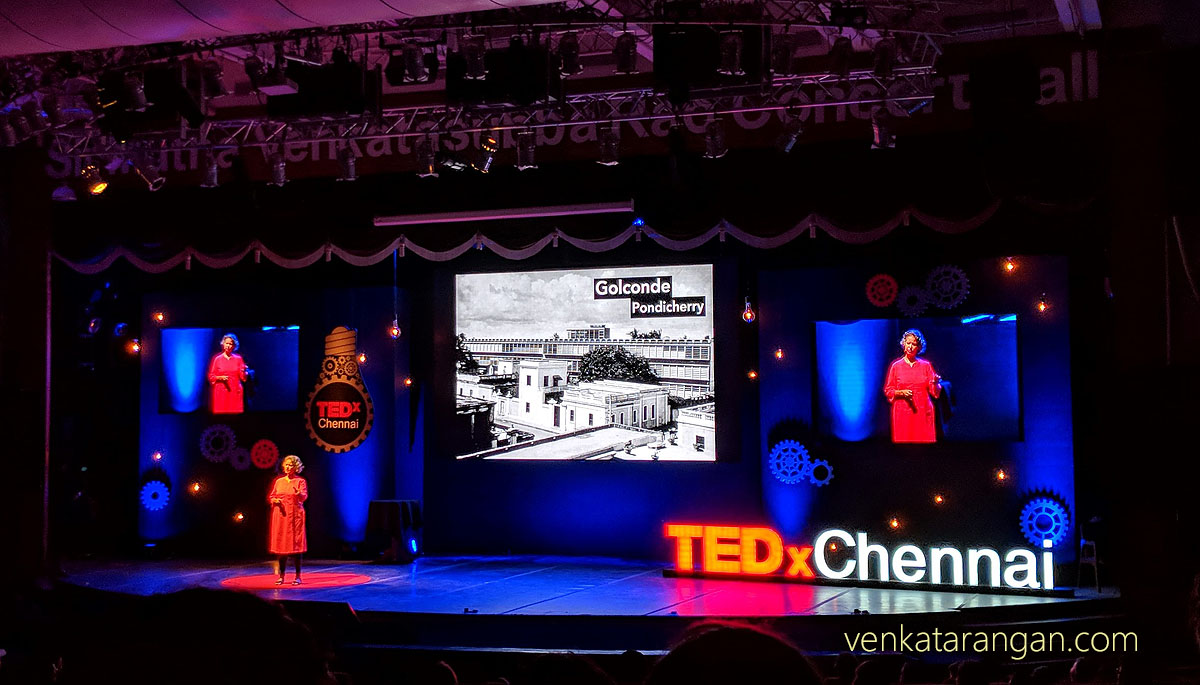
Anu Majumdar, author of “Auroville: A City for the Future”
7.Aruvi (2017) star Aditi Balan was the mystery speaker. She spoke from her heart, appeared simple and was good. She said it was a casual happening, her auditioning for the role and getting selected – which happened right after the completion of her law degree. Almost 80% of the cast in that film was first-timers and the Director ensured they all adequate rehearsals before putting them in front of the camera. Aditi confessed that few of her Doctor and NGO friends working with HIV Patients had been critical about few aspects of the film. I felt the interviewer could’ve avoided few questions – like asking the actor around the definition and feelings of the character and the story looked superfluous. You need to ask those questions to the Writer and the Director, just like Rajiv did in a later interview with Director R S Prasanna.
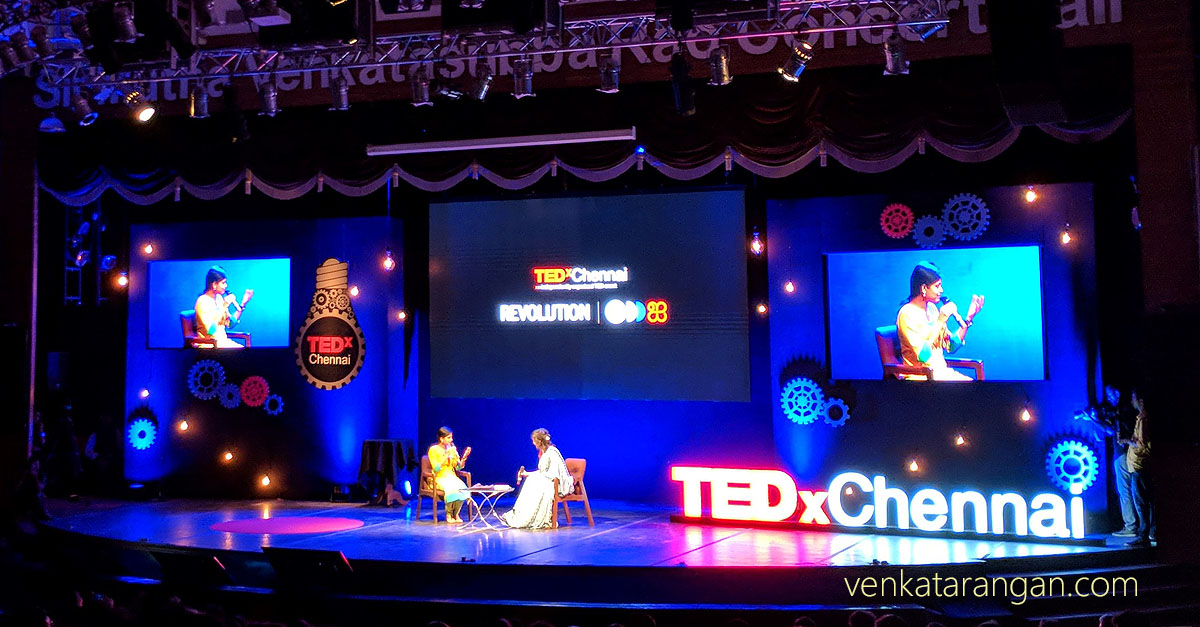
Aruvi (2017) star Aditi Balan
8.Next was a mime performance by the boys of Public School, Saidapet. Their skit was about the ill effects of smoking. They were outstanding, great performance.
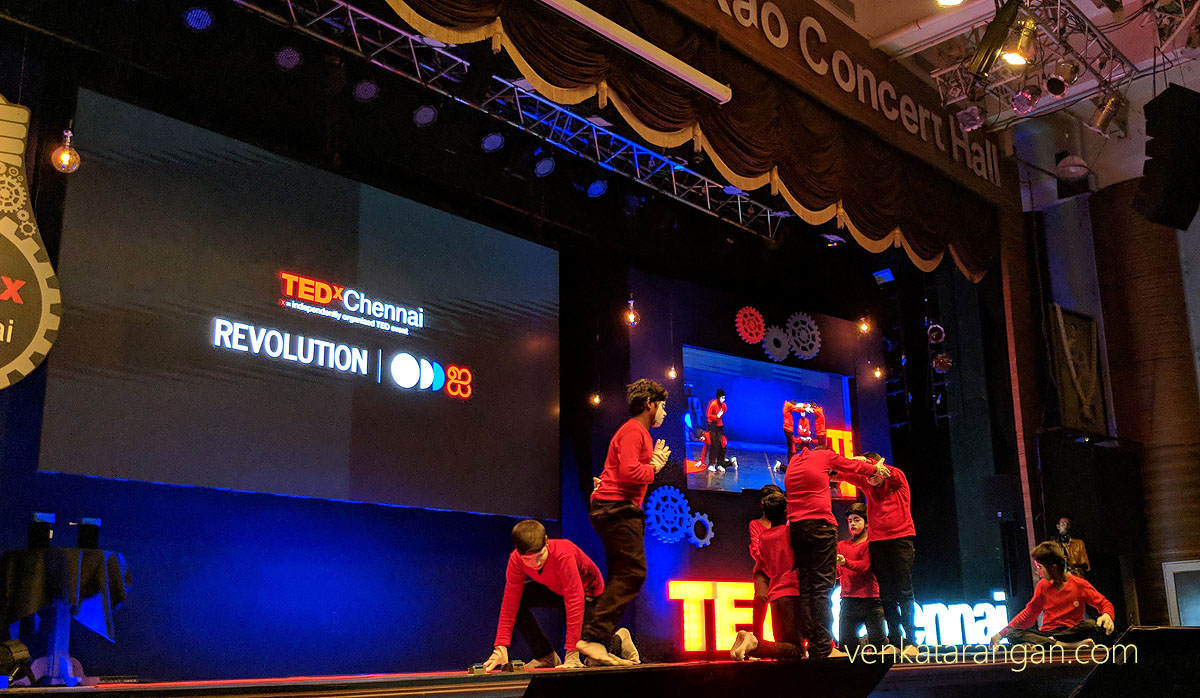
The boys of Public School, Saidapet
9. Gitanjali Rao, this 12-year-old spoke brilliantly and won the hearts of the entire audience. Getting a well deserved standing ovation, she was the star of the day. She spoke about the need for clean water and her invention of an affordable (now ₹1500, soon to be ₹300) deduction kit for testing the lead contamination in drinking water. It was unbelievable to learn that she has been working for last 5 years in promoting young girls to take up STEM (Science, Technology, Engineering & Maths). She had won many awards and accolades, including being invited to The White House and posing for a photograph with American President Donald Trump. Check her book “Baby Brother Wonders“.
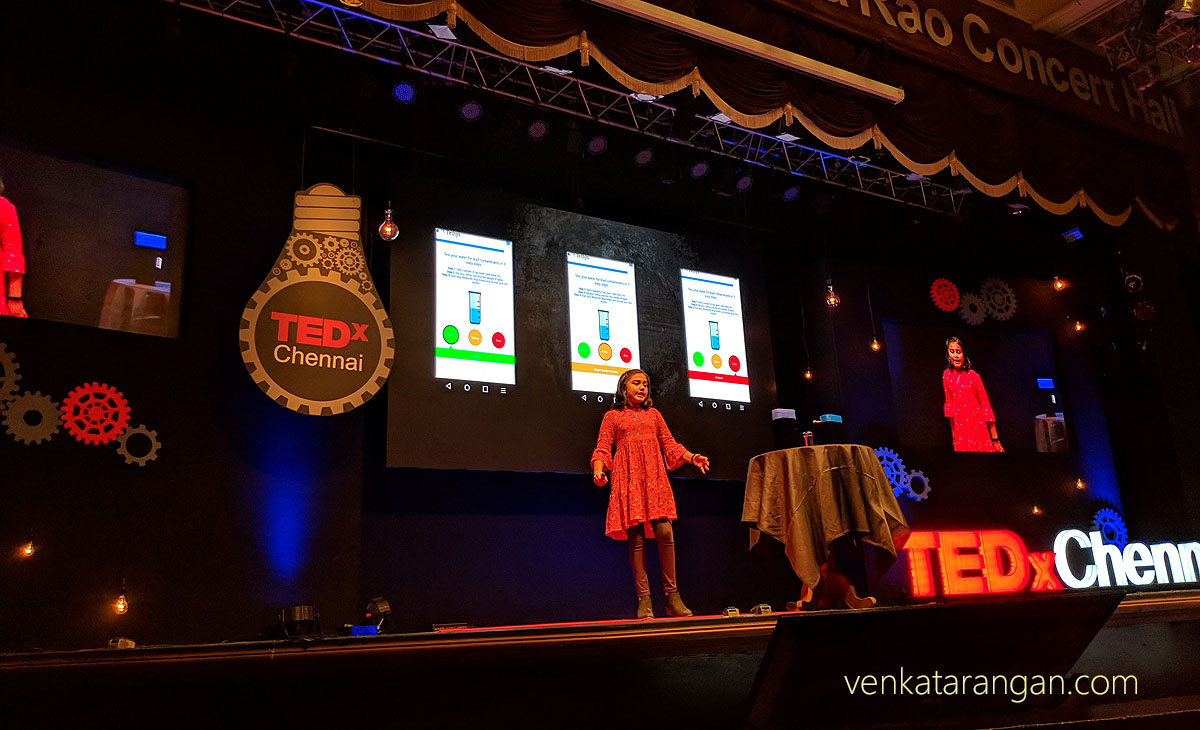
Gitanjali Rao – honoured as “America’s top young scientist” for inventing a quick, low-cost test to detect lead-contaminated water.
10. Dr Uma Venkatachalam, founder of Suyam Charitable trust. She narrated her story of noticing a young boy begging in the streets of Ayanavaram which motivated her to learn about his background – leading to an understanding of the plight of Nomadic Tribes in India, who are scattered around India in pockets and live mostly outside the mainstream society and Governmental fabric. Realising that educating the young is the way to improve their lives, she devised her own way of schooling for them – these kids who have never been to a school, will not fit into a traditional school, where it will require them to sit for 8 hours a day. Dr Uma’s system comprised of:
a. 4 Corner learning system
b. Iconwrite learning system – அவதானிக்கும் கல்வி முறை
c. Theatre and Arts
d. Interactive Windows Concept – for creating displays on science that kids can freely touch and feel, moving the science from the constraints of the lab
Thousands of students have passed out from her schools and many of them are studying in many countries around the world for their graduation degrees.
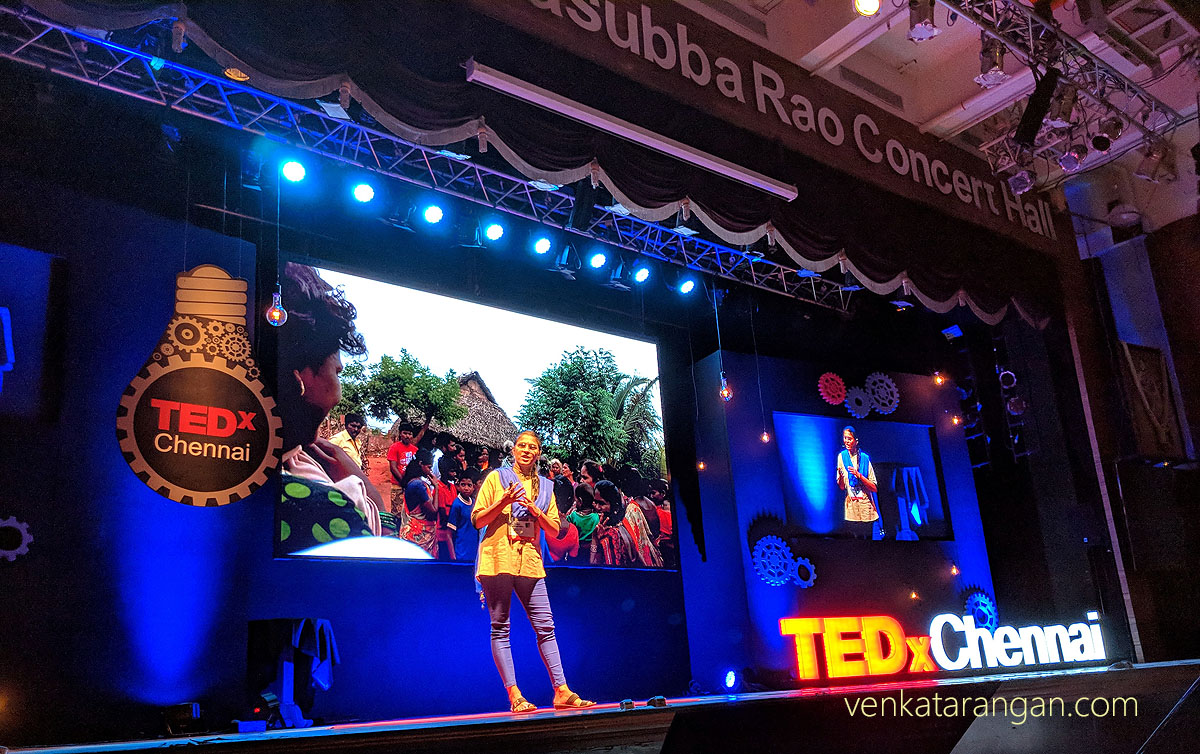
Dr Uma Venkatachalam, founder of Suyam Charitable trust
11. R S Prasanna, director of Kalyana Samayal Saadham was interviewed by J Rajiv Choudary. Prasanna was hilarious, frank and down to earth. The Chennai boy is the Director of Shubh Mangal Saavdhan (2017), the Hindi remake of KSS which is about male impotence. He touched on subjects that have been for long pushed under the carpet – as he said the carpet has now become a mountain. If you think it is taboo and leave out conversations of Sex, how do you educate against rape and teach about consent – another point he raised was the super glorification of male aggression in the family and in films – valid questions. His next film is going to be about another male organ – which one ??
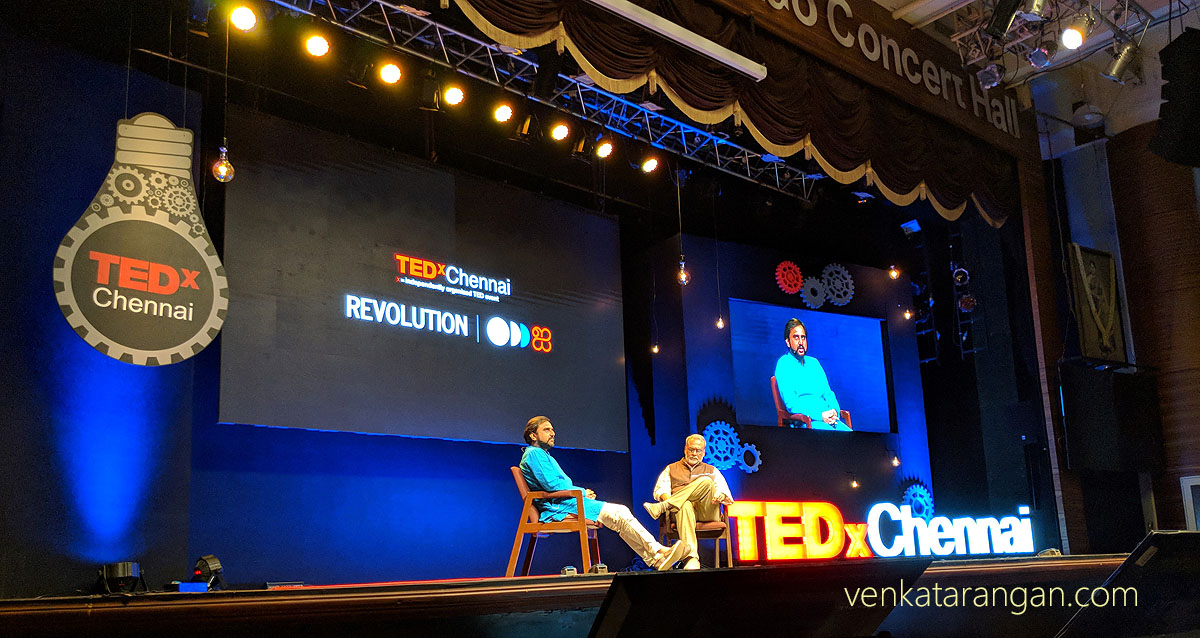
R S Prasanna, director of Kalyana Samayal Saadham
12. Jaspreet Bindra, SVP of Digital Transformation at Mahindra Group. I have known Jaspreet for more than a decade, from the time he worked as Country Head for MSN India, and he continues to a well-wisher of mine.
Jaspreet started with how a few years ago, their group chairman Mr Anand Mahindra was taken to blockchain and quickly saw the immense potential of it. Jaspreet continued with a simple explanation of blockchain, and on how the system and the trust work, like in a ladies kitty party. Then he presented four areas including Agriculture can benefit from Blockchain technology. He believes that Blockchain is going to be as disruptive as the Internet was.
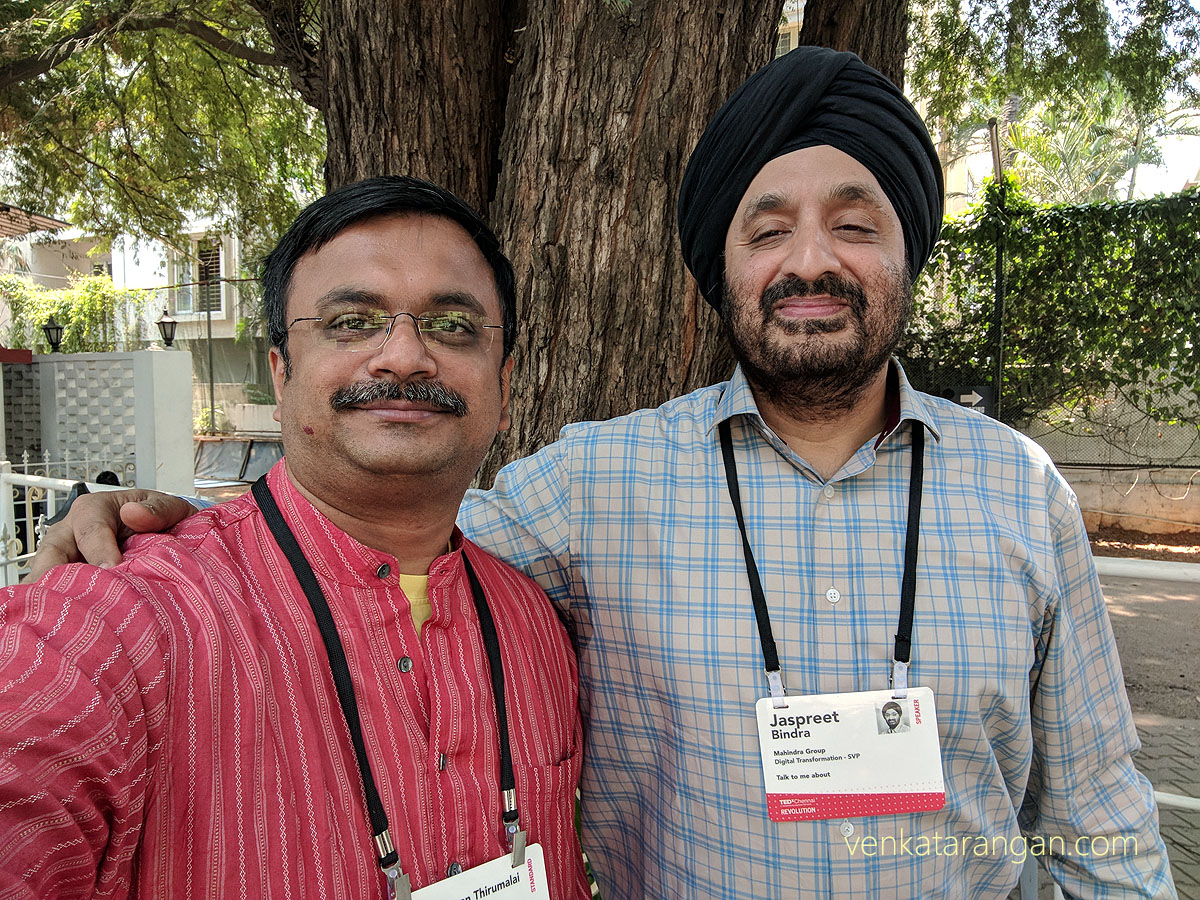
With Jaspreet Bindra
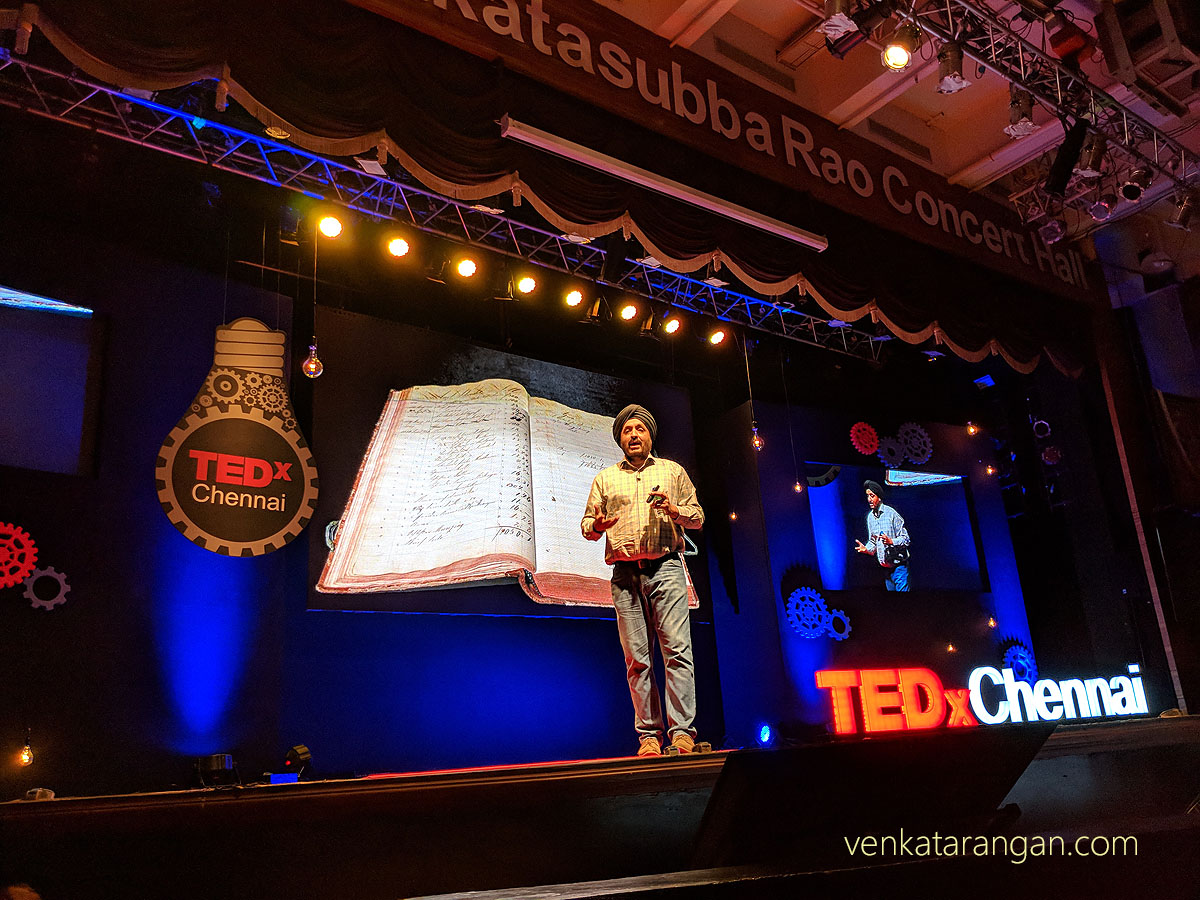
Jaspreet Bindra explaining the basics of the blockchain
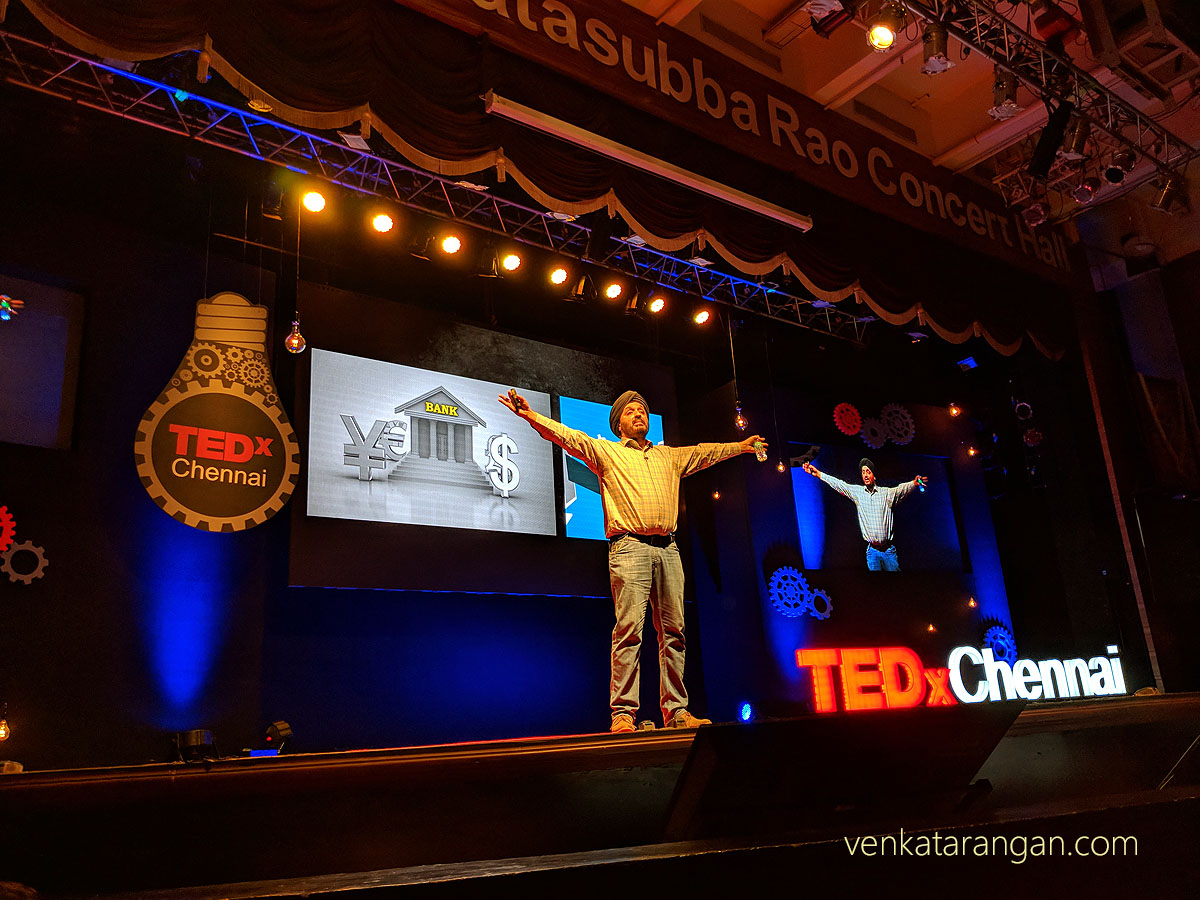
Jaspreet Bindra on the benefits of blockchain for India especially in the financial sector
In the breaks, video recordings of past TED talks were screened including Terry Moore’s how to tie shoe laces and Lux Narayan’s What he learned from studying 2000 obituaries of NY Times.
13. Sriram EMani, founder of Indian Raga (YouTube) spoke on how explaining to his niece a song by the legend M S Subbulakshmi, led him to start this brand. He narrated his experiences of staying with fifty different families across North America for a week at once. The vision is to introduce Carnatic Arts to the millennials in a way that is palatable and appreciable by them – bring it outside the confines of Religion and Tradition, at the same time preserving the soul and making it relevant for the present times.
Families bond over shared experiences, not by living under the same roof
Listen to their remix of Shape of You and Cheap Thrills, each of them has crossed over millions of views. His talk was followed by a live performance by the Indian Raga Troupe.
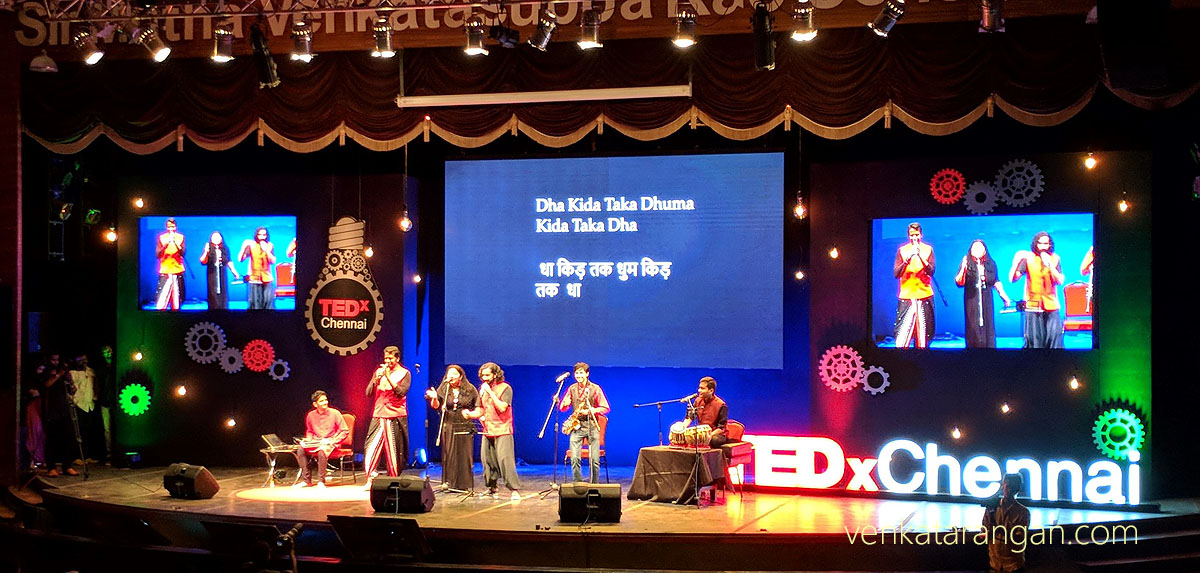
Live Performance of Indian Raga Troupe
14. Trishya Screwvala, trustee of Swades foundation talked about the need for a structured platform for volunteering in India and how she started Lighthouse project.
15. Rakesh Raghunathan, a food raconteur narrated his love for food originating from seeing his mother and grandmother preparing Puliyodharai, which was an elaborate ritual. He continued on how the failure with his food retail stores Pettarap, forced him to go on a soul-searching tour that landed him in Tirunelveli, where he meets a group of villagers harvesting their bountiful crop was engaged in singing and community cooking of Kuttansoru (கூட்டாஞ்சோறு). He is now engaged in discovering India’s collective history and heritage from the food and cuisine followed in different parts of the country. His one line for pucha puli rasam (பச்சை புளி ரசம்), one that requires no heating attracted me – made me feel even I can cook it!
Check out his videos at Puliyogare Travels channel.
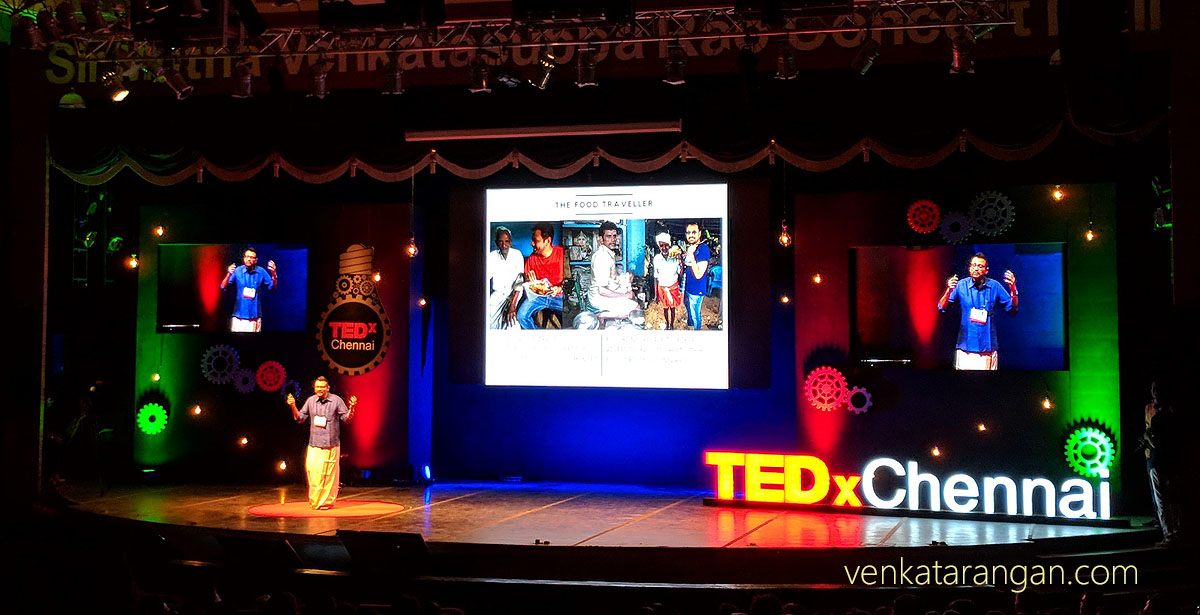
Rakesh Raghunathan – Puliyogre Travels
16. Dr Shannon Olsson heads the Naturalist Inspired Chemical Ecology at the Tata Institute of Fundamental Research. She talked about the importance of understanding the behaviour and decision making of insects, emphasising the need for humans to have empathy not only for fellow humans but extending it to all living creatures including insects. She demonstrated their creation, a virtual reality environment that includes a controlled 360-degree vision, wind and odour that makes a stationary insect believe it is flying – this way rather than getting into the head of an insect (not possible) we recreate the environment that changes from the cues/signals given out by the insect.
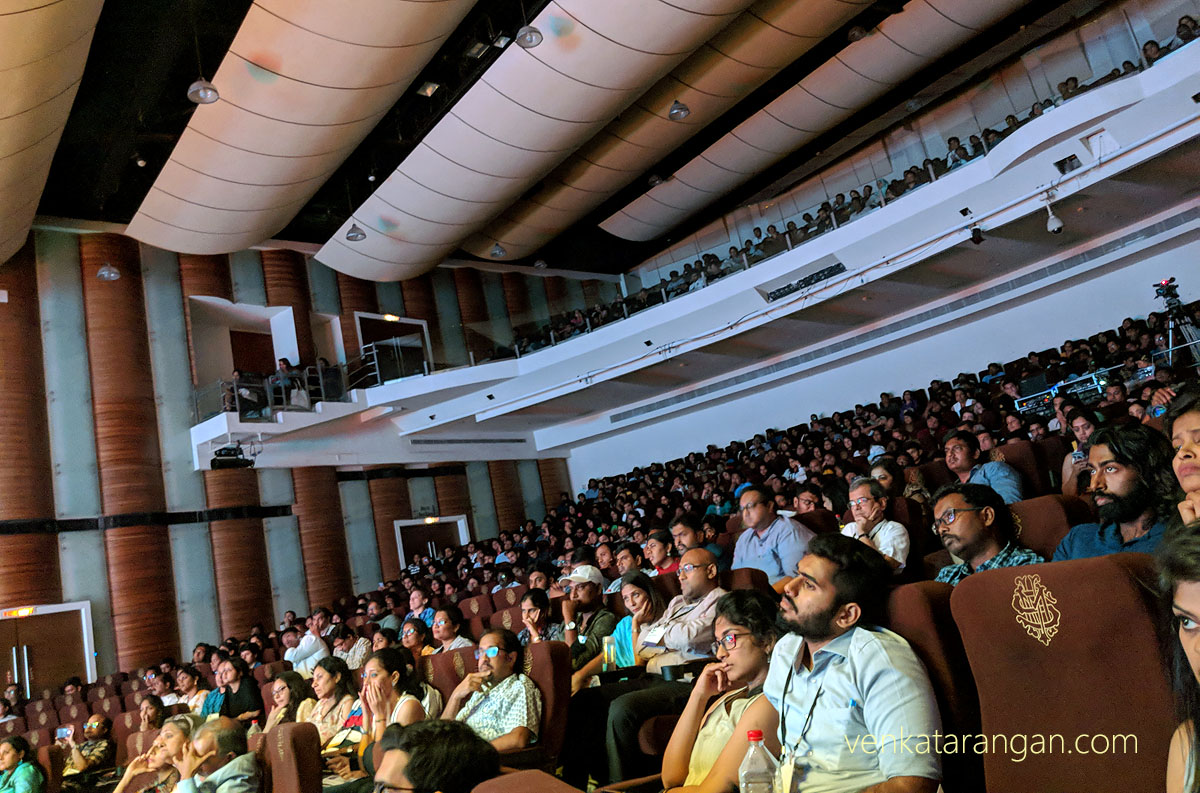
About 1000+ in the audience, a packed hall
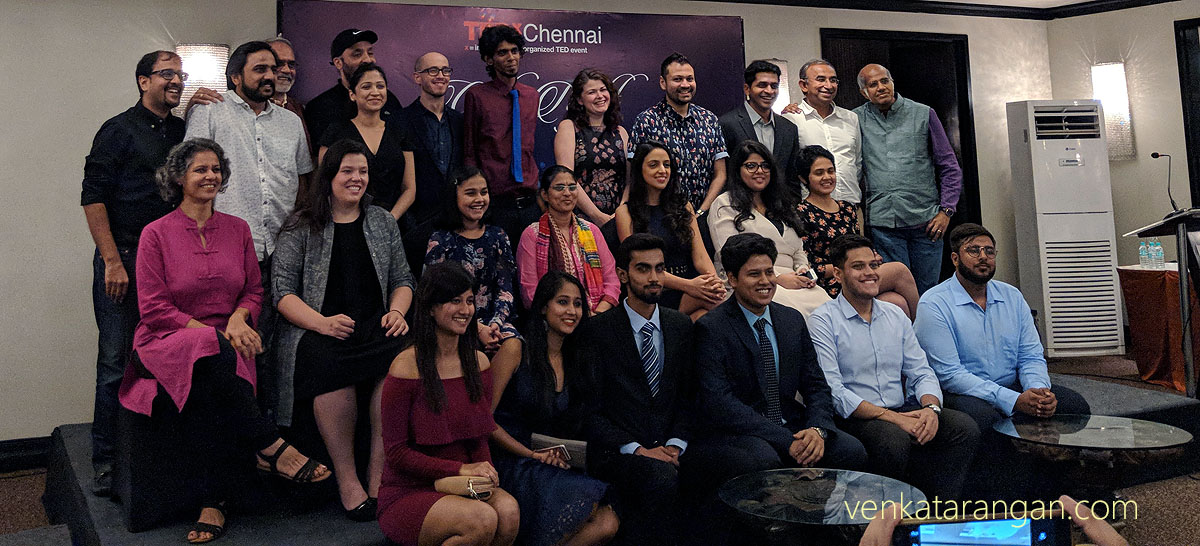
TEDxChennai 2018 Speakers posing for a snap during the curtain raiser dinner


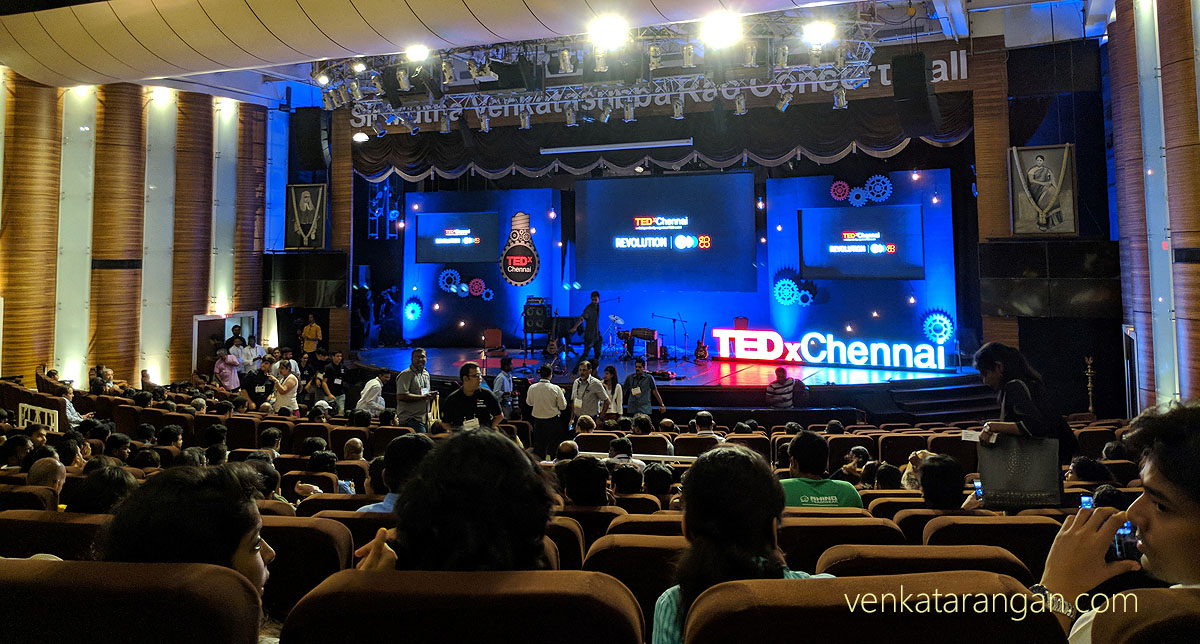
Comments